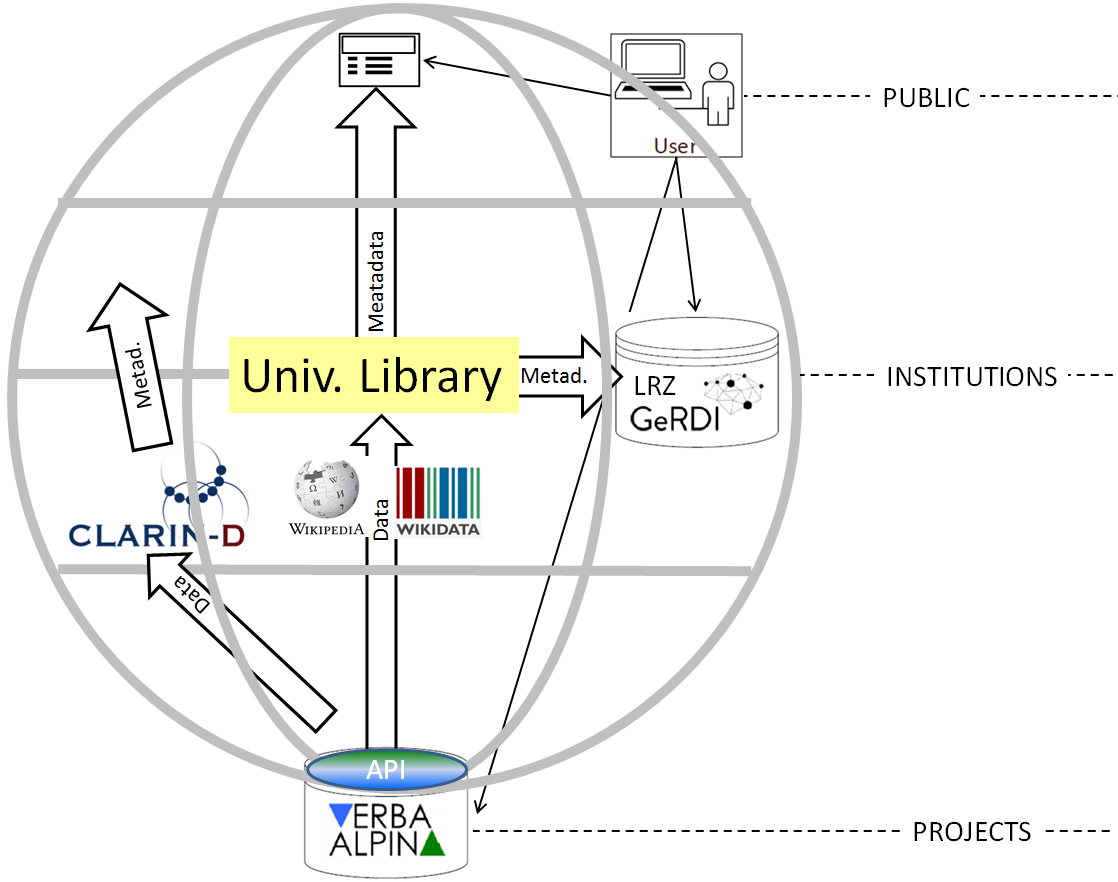
1. Introduction
- Ahead of all: June 2019 is VerbaAlpina-month! ⇒ current DFG-calender "Langfristvorhaben" (Twitter)
- Release of new Version 19/1 a few days ago
- Milestones since 2017:
- VA-phase 2 - new onomasiological domains: natural environment (flora, fauna, weather, landscape formations), traditional cooking
- Innovative form of publication: tight integration of cartogaphy and lexicography (example: VerbaAlpina-map BUTTER)
- Technological achievements:
- Crowdsourcing-Tool (around 11500 records of nearly 1000 informants since Feb. 2017)
- brandnew GIS (based on Leaflet & Open Streetmap)
- Stepping into the field of research data management, therefore ...
- Focus of this lecture: VerbaAlpina want’s to be FAIR!
| FAIR principles | |
| Data have to be | Findable |
| Accessible | |
| Interoperable | |
| Reusable | |
2. How VerbaAlpina copes with FAIRness
| VA features | F | A | I | R |
| Storing data in several repositories (cooperations with projects eHumanities - interdisziplinär, GeRDI, Clarin-D Centre Leipzig) | ||||
| Versioning (citable) | ||||
| Free open license (CC BY-SA) | ||||
| API interface (new!) | ||||
| Fine granularity of data | ||||
| Applying persistent identifiers (DOI, URN) | ||||
| Using normdata (Q-IDs, GND, L-IDs?) | ||||
| Using open source software (new GIS-framework Leaflet combined with Open Streetmap - independence from Google!) | ||||
| Detailed documentation (section methodology) | ||||
| Long-term perspective through embedding in enduring institutional frame (forming cluster "FDM-DH-centre", consisting of IT-Gruppe Geisteswissenschaften [ITG] and University Library of the LMU) |

3. Beyond VerbaAlpina: The general situation so far
- Shortcomings in many of the sources, atlases as well as dictionaries, used by VerbaAlpina (in most cases not entirely FAIR or even not FAIR at all!)
- Various levels - Examples:
- ALI (http://www.atlantelinguistico.it/atlante/parole-e-carte.html; not FAIR at all: "traditional" publication as books)
- recently published dictionaries of Ladin dialects (Dolomites) (https://www.micura.it/de/woerterbuecher; not (but potentially) FAIR: based on traditional publication [books], secondarily made up for online presentation; basically still separated datasets although all parts documenting the same dialect [a detailed comment on this "project" soon to appear in the journal Ladinia])
- Idiotikon (https://digital.idiotikon.ch/idtkn/id12.htm#!page/120031/mode/1up ; limited FAIR: entries not precisely addressable)
- Dicziunari Rumantsch grischun (DRG; http://online.drg.ch/#8414d1af5d548babb57812592d0314d4 ; fairly fair: opaque link names)
- Atlant linguistich dl ladin dolomitich y di dialec vejins (ALD; https://www.verba-alpina.gwi.uni-muenchen.de/?page_id=133&noredirect=de_DE&tk=1950&db=162; finally FAIR: after integration of dataset into VerbaAlpina; easy processing because of very good preparation [character encoding, data structure])
| ALI | Ladin dict. | Idiotikon | DRG | ALD |
| finally fair | ||||
| fairly fair | ||||
| limited fair | ||||
| (potentially) | ||||
| not at all fair |
not yet fair |
4. Helping partners and bringing things together - VerbaAlpina beyond the Alps
- VA provides free and freely manageable MySQL-databases to its partners
- Atlante linguistico siciliano (ALS, Roberto Sottile; http://www.als-online.gwi.uni-muenchen.de/carta/)
- Atlas pan-picard informatisé (APPI), VerbaPicardia (Esther Baiwir; https://appi.dethier-renders.be/index.php/karte/?db=1)
- Project Lexicographia coniuncta, LexiCon (LMU cooperation of Romance Philogy, University Library and ITG); Project proposal to the DFG in 2019
5. What to do next? The perspective of VerbaAlpina
- Fostering cooperation with lexicographical "players" - A warm WELCOME to all of you!
- Mantra: individual independance for everyone, meaning: organise your work just as you like
- Developing a system of interfaces, thus connecting individually managed data
- Further promotion of normdata (Wikidata, GND, whatsoever ...)
- Widely applied FAIRness:
- open licenses
- open source software
- fine granularity of data, thus providing interoperability
- application of persistent identifiers
- providing APIs for automatic data access
- focus on libraries, using temporary solutions in the field of data management only additionally
- foster creation of endurable institutions with specific know how in the field of Digital Humanities (like ITG)